International
Germany: semaphore government is failing heavily in the economy. The Intel, VW and Thyssen Krupp cases

One can almost feel sorry for the politicians in the “Semaphore coalition,” “Ampel” in German. For several weeks, one bad news from the economy followed another: no growth, no investment, job cuts, even factory closures and bankruptcies. As soon as one fire goes out, the next fire begins. Although traffic lights play a part, this government is not the only source of the issues. They are the consequences of years of inaction that are now falling on the feet of this government.
Intel, Thyssenkrupp and Volkswagen: three big companies cut jobs
The traffic light coalition currently employs three companies: first, Intel, which will not build its outrageously expensive billion-dollar factory in Magdeburg for the time being because it faces austerity constraints. The federal government had promised the chip giant a subsidy of nearly ten billion euros if it built its factory in Germany with 3,000 new jobs.
Then, of course, it is Volkswagen that is of great concern to the government. In early September, Europe’s largest automaker announced that plant closures in Germany and company layoffs could no longer be ruled out . In Germany alone, the group employs nearly 300,000 people, according to the group’s 2022 annual report.
Last but not least, there is Thyssenkrupp, whose steel division just made headlines with a scandal involving CEO Miguel López. At the heart of the dispute is how much money the steel division needs and how many jobs will be lost. In total, Thyssenkrupp employs 56,000 people in all divisions in Germany, including 27,000 in the steel division alone.
In Germany, the transformation has been delayed for a long time: VW and Thyssenkrupp are suffering the consequences
These three are currently receiving the most attention. But periodic economic reports from economic institutes show that it is not just them that are hurting. Germany’s economy is stagnant and will likely experience zero growth in 2024. Whatever the federal government does, its measures so far have not been effective. And the growth initiative passed in the summer by the semaphore coalition is not causing gasps of joy in the economy.
The causes of the problems are obvious: Germany has not invested in climate-neutral conversion for too long. As economic expert Veronika Grimm tells Wirtschaftswoche: “The site had been in good shape for a long time, but it was draining its substance. But now the scope is shrinking more and more, partly because the need for action has been swept under the rug for too long.”
This can also be seen at VW and Thyssenkrupp Steel. Both companies are now embarking on their transformation processes; for VW it is the transition to electromobility and for Thyssenkrupp it is the decarbonization of steel. It was clear that this structural change would entail costs, but it is only now that everyone involved is becoming painfully aware of what this might mean.
BDI warns: transformation will cost even more money than expected
The federal government is investing a lot of money; billions are flowing into building green power plants and promoting the transformation of medium-sized companies. Thyssenkrupp alone has received two billion from the federal government to convert its coal-hydrogen furnaces. But more money is needed, as the Federation of German Industries (BDI) recently explained: by 2030, the industry will need 1.4 trillion euros of investment, 460 billion euros of which should come from state sources. For comparison: in 2025, the federal government plans to spend a total of 488 billion euros.






